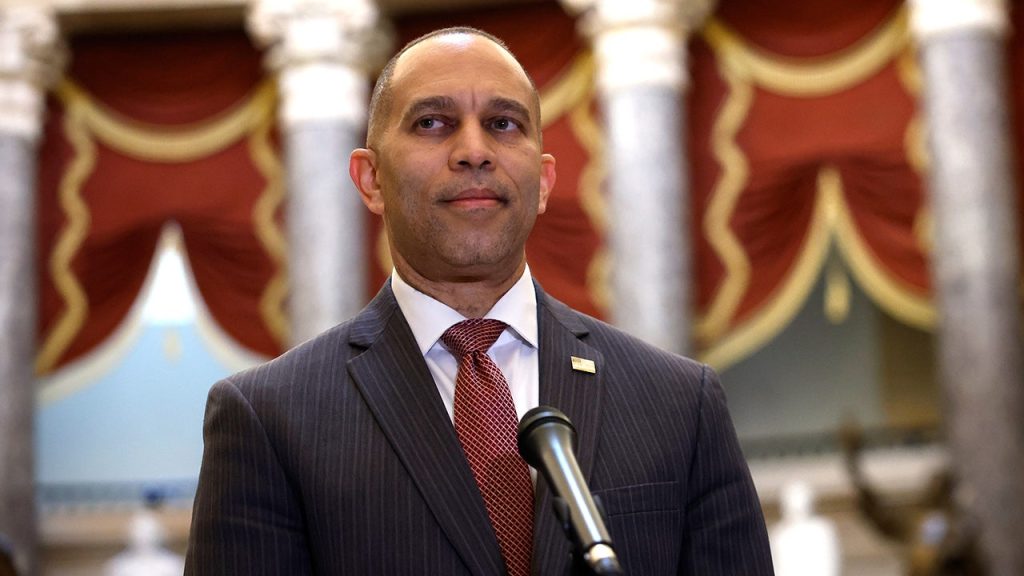The political landscape in Washington D.C. is fraught with tension as House Democrats vehemently oppose the latest government spending plan presented by Speaker Mike Johnson. This new proposal, dubbed the “Musk-Johnson proposal” by critics, has been met with derision from Democrats, with House Minority Leader Hakeem Jeffries labeling it “laughable” and accusing “extreme MAGA Republicans” of pushing the country towards a government shutdown. The Democratic leadership is actively urging its members to vote against the deal, signaling a deep partisan divide and raising concerns about the ability of the government to function effectively. This latest iteration of the spending plan comes after a previous agreement was reportedly scuttled by conservative opposition, with notable influence from figures outside the traditional political sphere, namely Elon Musk and Vivek Ramaswamy. This interference from non-governmental actors has further complicated the already tense negotiations, with some Democrats expressing concern about the undue influence of these individuals on the legislative process. The situation underscores the growing polarization and difficulty in reaching bipartisan consensus on critical government functions.
The new continuing resolution (CR) proposed by Speaker Johnson aims to extend current government funding levels for three months and suspend the debt limit for two years, a demand made by President-elect Trump. This proposal represents a significant departure from the original 1,500-page CR, which faced strong opposition from the right wing of the Republican party due to various policy riders and funding allocations. While the streamlined 116-page bill attempts to address some of the earlier concerns, it remains unclear whether it will garner enough support to pass. Rep. Chip Roy, a prominent figure in the opposition to the initial bill, has already voiced his disapproval of the new deal, citing concerns about increased debt and government spending. This continued resistance from within the Republican ranks highlights the challenge Speaker Johnson faces in securing the necessary votes, potentially requiring him to rely on Democratic support to avoid a government shutdown.
The situation is further complicated by the involvement of external actors like Elon Musk and Vivek Ramaswamy, whose influence on conservative lawmakers has raised eyebrows and sparked controversy. Their intervention in the legislative process has been met with criticism from some Democrats, who view it as an inappropriate intrusion into the workings of government. The previous deal, reportedly agreed upon by all parties, was ultimately derailed by conservative backlash fueled by Musk and Ramaswamy, leading to the current impasse. This external pressure has added another layer of complexity to the already difficult negotiations, underscoring the challenges of navigating the current political climate. The involvement of these non-governmental figures raises questions about the integrity of the legislative process and the potential for undue influence on policy decisions.
President-elect Trump, however, has expressed his support for the new deal, urging both Republicans and Democrats to vote in favor of the bill, which he calls the “American Relief Act of 2024.” He touts the deal as beneficial for the American people, claiming it will keep the government open, provide funding for farmers and disaster relief, and address other key priorities. Trump’s endorsement adds another dimension to the already complex situation, potentially influencing the votes of Republican lawmakers who are torn between party loyalty and fiscal concerns. While Trump’s support might help sway some votes in favor of the deal, it also risks further alienating Democrats and exacerbating the partisan divide. The conflicting pressures and competing interests make the outcome of the vote highly uncertain.
The looming threat of a partial government shutdown hangs heavy over the negotiations, with the potential for significant disruption to essential services and programs. Democrats, while expressing their strong opposition to the current proposal, are also grappling with the need to find a solution that avoids a shutdown. They are now faced with the difficult task of trying to salvage the public good amidst the political wreckage, navigating the complex web of competing interests and external pressures. The potential consequences of a shutdown are far-reaching, affecting everything from national security to social services, and the pressure to find a resolution is immense. The coming days will be crucial in determining whether lawmakers can overcome their differences and avert a crisis.
This latest standoff over government funding highlights the deep divisions within the American political system and the growing challenges of governing in a polarized environment. The involvement of outside figures like Musk and Ramaswamy has further complicated the process, raising questions about the proper role of non-governmental actors in influencing policy decisions. With a looming government shutdown and a deeply divided Congress, the path forward remains uncertain. The need for compromise and bipartisan cooperation has never been greater, yet the current political climate makes achieving such consensus increasingly difficult. The consequences of failure could be significant, with the potential for widespread disruption and further erosion of public trust in government.

